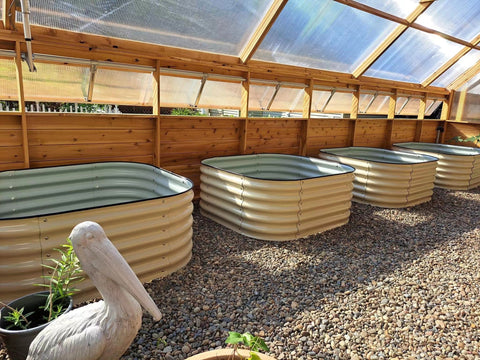Efficacious Ways to Deal with Pests in Garden Beds
Imagine the following scenario: After spending numerous hours caring for your Garden beds and treating your plants with love and care, you discover that they are being attacked by annoying pests. The situation is frustrating for many gardeners. But don't worry! There are efficient and environmentally friendly solutions to manage garden pests and maintain the health of your priceless plants. In this blog, we'll look at several effective ways to get rid of pests in garden beds without using dangerous chemicals.
Companion Planting:
One of the most natural ways to deter pests is through companion planting. Certain plants can repel or confuse common garden pests, making it harder for them to find your prized vegetables and flowers. For example, planting marigolds near your tomatoes can help deter nematodes, while basil can repel flies and mosquitoes. Do some research to discover which companion plants work best for your specific pest problems.
Attract Beneficial Insects:
Not all insects are harmful to your garden. Some are actually your allies in the battle against pests. Encourage beneficial insects like ladybugs, lacewings, and parasitic wasps to visit your garden by planting nectar-rich flowers and providing shelter. These insects can help keep populations of aphids, caterpillars, and other garden bed pests in check.

Handpicking and Pruning:
Sometimes, the most effective method is the simplest one. Regularly inspect your garden for pests and remove them by hand. Wear gloves and bring a bucket of soapy water to drown any pests you find. Prune affected leaves or branches to prevent the spread of infestations. This hands-on approach can be time-consuming but is highly effective, especially for larger pests like caterpillars and slugs.
Organic Pest Sprays
If you're dealing with a more extensive pest problem, consider using organic pest sprays. These concoctions, often made from ingredients like garlic, neem oil, or soap, can help control common garden pests. They're less harmful to the environment and the beneficial insects in your garden compared to chemical pesticides. Be sure to follow the instructions carefully and avoid spraying during peak sunlight hours to prevent damage to your plants.
Crop Rotation:
Crop rotation is a strategic gardening practice that involves planting different crops in the same area season after season. This disrupts the life cycles of pests that are specific to certain plants, reducing the chances of infestations. It also helps improve soil health and nutrient balance.
Barrier Methods:
Physical barriers can be an effective way to keep pests out of your garden beds. Use row covers or mesh netting to protect plants from insects like aphids, cabbage worms, and root maggots. Floating row covers are particularly useful for this purpose, as they allow sunlight and water to reach your plants while keeping pests at bay.

Healthy Soil and Plants:
Lastly, maintaining healthy soil and strong, vigorous plants is your best defense against pests. Healthy plants are less susceptible to infestations, as they can better withstand attacks. Use organic compost and mulch to enrich your soil and provide your plants with the nutrients they need to thrive.
Although it can be difficult, controlling pests in your garden beds is not impossible. By using these effective and environmentally responsible techniques, you can protect your plants while preserving a wholesome and balanced garden ecosystem. When it comes to controlling pests in your garden, keep in mind that persistence and patience are essential. With patience and hard work, you may reap a rich crop and have a chemical-free, flourishing garden. Enjoy your garden!
